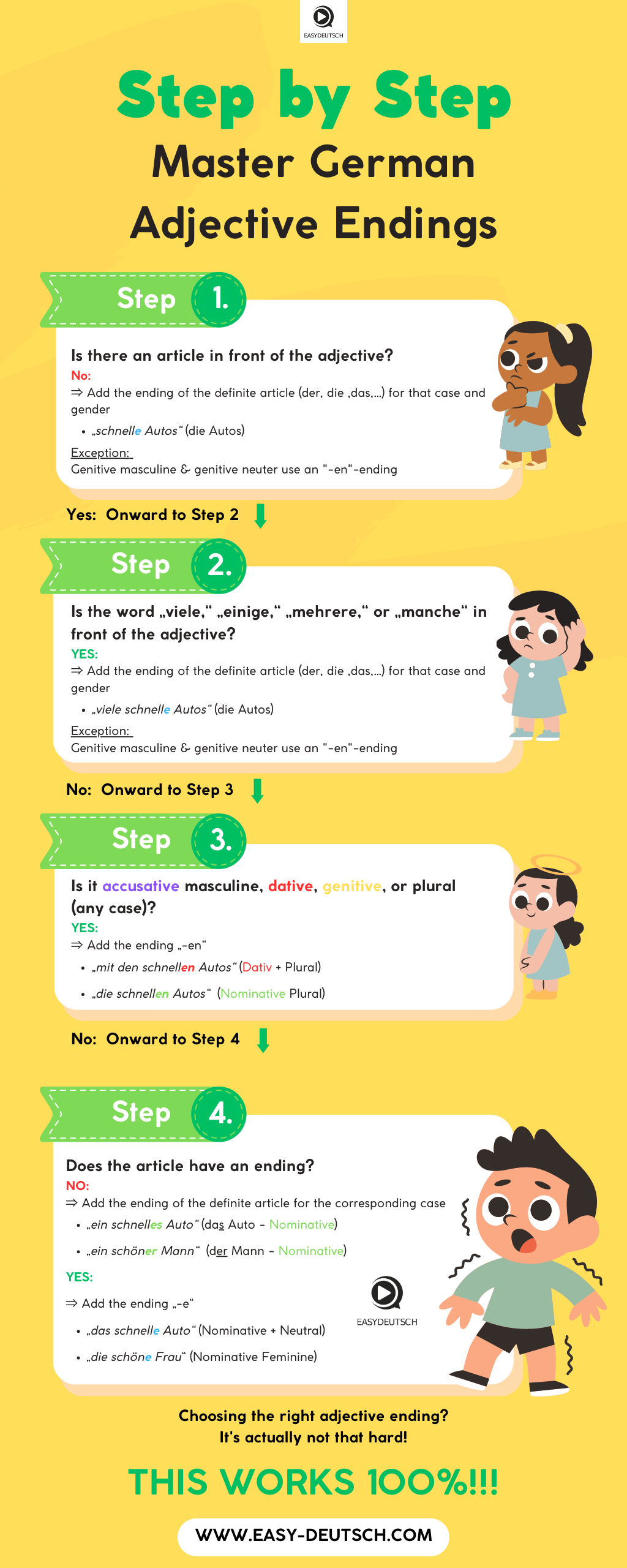Do you prefer to read this lesson German Adjective Endings in German? Switch language now!
Messing up the German Adjective Endings is one of the most common mistakes German learners commit. You are not alone! Learn today how you can avoid making mistakes with German Adjective Endings! This includes a simple Step-by-Step Guide to the correct Adjective Ending! So read the article till the end! It's worth it!
First: Why do so many people struggle with German Adjective Endings?
German learners make many mistakes with German adjective endings due to the complex grammar system, unfamiliarity with the concept, reliance on intuition, often a lack of practice and reinforcement, and of course challenges with speed and fluency.
To overcome these, you should understand the rules, practice regularly, seek feedback, and build a strong foundation in German grammar. But how can you do that?
To avoid mistakes with adjective endings, follow these 7 guidelines:
- Understand the Case System: Familiarize yourself with the four German Cases (nominative, accusative, dative, and genitive) and their respective functions. In order to pick the correct adjective ending, you have to know which case the noun the adjective is describing is using. If you continue to struggle with German Cases I highly recommend you to check out my explanations about German Cases here on my website or purchase my e-book Nominative, Accusative, Dative or Genitive? - No Problem! - If you don´t understand German Cases after reading this e-book you will get your money back!.
- Pay Attention to Articles in front of the Adjective: German Adjective endings always depend on the article that precedes the noun. Practice recognizing and applying the correct endings in different contexts. Rule of thumb: If the article already shows the case, the German Adjective Ending can only be "-e" or "-en" - if not: Add the ending of the definite article!

German Definite Articles

Do you see the pattern?
- Never neglect the gender of the noun: You have to memorize the gender of every noun together with its meaning. Color codes are one way to make it easier for your brain to memorize the correct German gender. If you haven't signed up for my free email grammar course, I recommend you to sign up for it now! In the first lesson, I will show you how you can guess 75% of all nouns correctly with the EasyDeutsch Article Secret.
- Practice with Exercises: Engage in exercises specifically designed to practice adjective endings. This can include completing sentences with the correct endings or rewriting sentences to match different cases or genders. EasyDeutsch provides you with this kind of exercises: Exercises for German Adjective Endings
- Read and Listen to German Texts: Expose yourself to authentic German texts, such as articles, books, or podcasts. EasyDeutsch will soon provide you with tailormade engaging and entertaining short stories to help you getting your German to the enxt level but in general every exposure will help you to develop a sense of natural adjective ending usage.
- Seek Feedback and Correction: Have your writing or speaking practice reviewed by a native German speaker, tutor, or language exchange partner. Ask them to point out any mistakes or inconsistencies with adjective endings so you can learn from them. If you are still looking for a German teacher you can find them here: EasyDeutsch Online Deutschlehrer
- Use the EasyDeutsch Step-By-Step Guide to German Adjective Declension ( = German Adjective Endings): This guide will help you to make quick decisions and check the endings in written exams quickly without loosing too much time. But in order to make it work, you must have understood how the German cases work and which gender the German noun has!
Basics to German Adjective Declension
This will be a quick overview for you on how to determine the German Adjective Endings. If you are the type of learner who wants/needs to understand how or why something works teh way it does I recommend you to check out my article about German Adjective Declension (Adjektivdeklination) where i explain in detail - charts, tables and endings and all the WHYs! 🙂
Rule 1: The Base
Everything is based on the definite article endings (bestimmte Artikel):

You don´t believe me? Check this out:

Do you see the pattern?
Except for genitive masculine and neutral, the adjective ending is exactly the same like the endings of the German definite articles of the first table (Attention: Check rule 2 why it´s "-e" or "-en" in table 1)
Rule 2: The lazy Adjective
If the article already shows the case already, the adjective can stay "lazy" and takes "-e" for nominative singular and accusative feminine and neuter - everything else takes "-en".
Always remember those two rules - they are the base for all German Adjective Endings!
Again: If you want to know all details, check out my detailed Guide to German Adjective Declension.
Step by Step: Mastering German Adjective Endings

Share this Info Graphic with your friends!
By following these steps, you can gradually improve your understanding and application of adjective endings in German, reducing the likelihood of making mistakes in this area.

The Most Important:
Don't be discouraged from speaking. Making mistakes is part of the progress! It's part of language learning! And how much do you care if somebody makes a mistake in your native language, but you are still able to understand him or her? I bet you don't care at all! That's exactly how much other people care about you making a mistake!
The best way to learn German Adjective Endings and any language is to speak it, to practice it. Trying to get rid of all errors is just for your personal confidence and self-esteem!
So start speaking!






